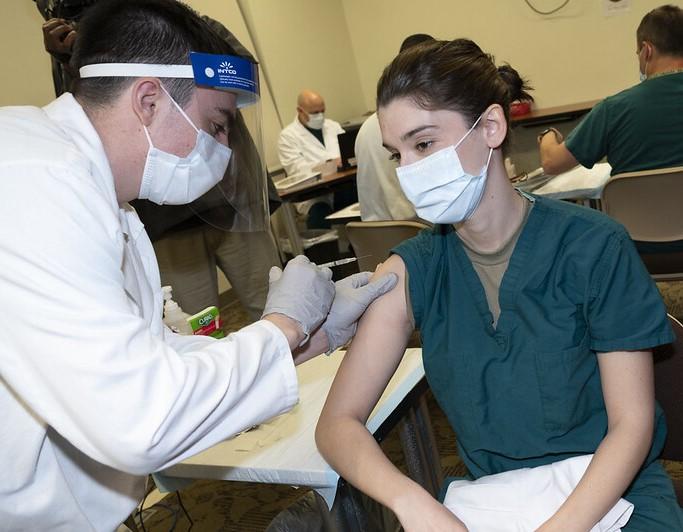Israeli healthcare workers who received a third dose of the Pfizer/BioNTech mRNA COVID-19 vaccine had significantly lower rates of infection in the next 39 days, according to a single-center study yesterday in JAMA.
On Jul 30, 2021, the Israel ministry of health began offering booster COVID-19 vaccines to people 60 and older, later expanding availability to younger residents. In the United States, boosters are now available to people ages 12 and older and for those 5 to 11 with compromised immune systems.
A team led by Tel Aviv University researchers assessed SARS-CoV-2 infection rates among 1,650 healthcare workers with normal immune systems given a booster dose of the Pfizer vaccine after receiving a second dose a median of 210 days before and compared them with 278 not given a booster. Participants were considered boosted if they had received a third injection at least 7 days before.
Enrollment took place from Aug 8 to 19, 2021, after the emergence of the Delta (B1617.2) variant, and follow-up ended on Sep 20. Median participant age was 44 years, and 71.6% were women. Participants were tested for COVID-19 using polymerase chain reaction (PCR) every 2 weeks, and their anti-spike protein immunoglobulin G (IgG) antibody levels were assessed at baseline and 1 month after receipt of the booster.
Much lower symptomatic, asymptomatic infection rates
During a median 39 days of follow-up, 44 of 1,928 participants were diagnosed as having COVID-19, for an incidence of 0.2 per 100,000 person-days. Five booster recipients followed for a median of 26 days and 39 unboosted participants were infected, for incidence rates of 12.8 versus 116 per 100,000 person-days, respectively.
A time-dependent Cox regression analysis showed an adjusted hazard ratio (aHR) of 0.07 between those who received and didn't receive a booster. Twenty-eight (71.7%) of the 39 unboosted and 3 of 5 (60%) boosted participants had symptoms, for incidence rates of 32.7 and 5.1, respectively. aHRs for symptomatic versus asymptomatic infection were 0.07 and 0.08, respectively.
Of COVID-19 booster recipients, 953 of 1,021 (93.3%) reached the maximum value measured by the antibody assay, while no significant differences were identified from baseline to follow-up among booster nonrecipients.
A post hoc analysis showed a link between lower levels of IgG and greater risk of infection, and a multivariable Cox regression found that low baseline IgG levels and earlier receipt of the initial vaccine regimen were also significantly tied to SARS-CoV-2 infection.
The researchers said that the findings are in line with those from previous Israeli booster studies among multiple age-groups and those in people older than 60. "Moreover, this study addressed immunocompetent health care workers [those with healthy immune systems], a population not included in recent studies on the effect of booster vaccination," they wrote. "Ongoing surveillance is required to assess durability of the findings."
Fourth doses may not be needed
In a commentary in the same journal, Anna Wald, MD, MPH, of the University of Washington at Seattle, said it is important to consider whether this vaccination is a booster or third dose. "The interval between vaccine doses is important in terms of resulting in durable immunity, with a longer interval more likely to establish a durable response," she wrote.
Wald said that COVID-19 booster doses could help reduce the risk of transmission of variants of concern. "This is especially critical during the current Omicron [B.1.1.529] surge, as this variant appears to cause infection even in persons with vaccine-induced immunity," she said. "However, higher levels of neutralizing antibody following booster vaccination provide additional protection against the Omicron variant."
A third dose of mRNA COVID-19 vaccines may result in an immune response robust and long-acting enough to obviate the need for future boosters, and formulation of novel vaccines that protect against coronavirus proteins that are less prone to mutation could lead to broader population immunity, she added.
"The evolution and epidemiology of SARS-CoV-2 have not been predictable, and being prepared to respond, such as with effective vaccines and booster doses of vaccine as needed as well as with nonvaccine mitigation strategies, remains critically important to help reduce SARS-CoV-2 transmission, and the morbidity and mortality from COVID-19," Wald concluded.




















